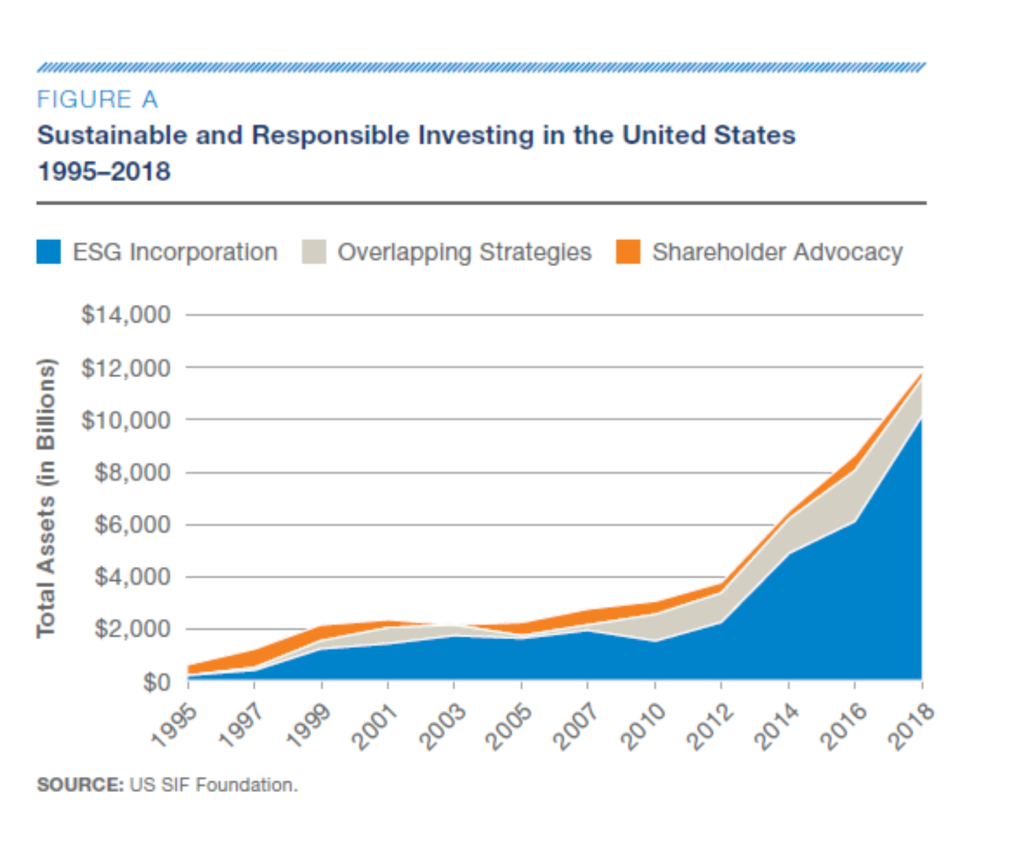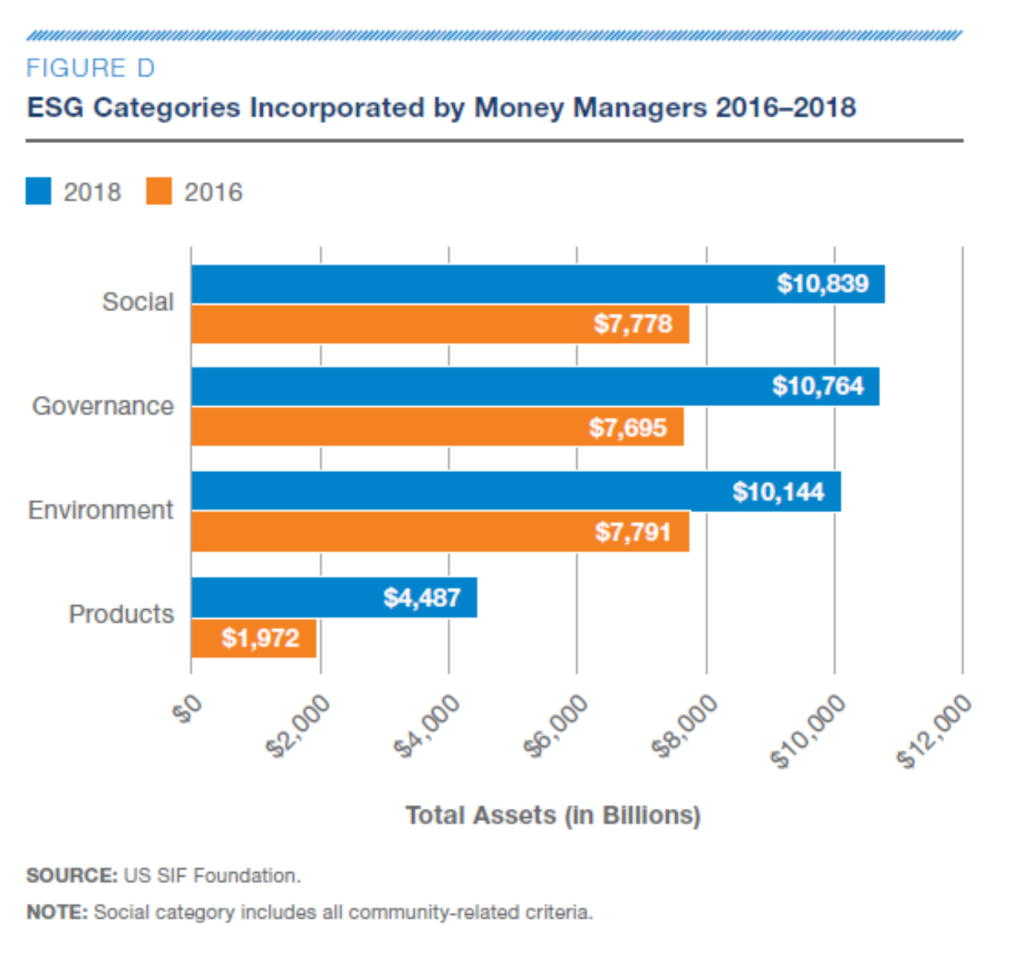Environmental, Social, and Governance (ESG) investment topics alongside Impact Investing have gained substantial popularity within the past few years. While the shift towards these types of investments is very beneficial for our society and world at large, we must also take caution in navigating this complex space and strive to educate investors. At Aaron Wealth, we seek to become the leader within this area, but doing so cautiously and with the right ethical principles in mind. This is first and foremost one of the most important aspects of the movement to aligning values with investments.
While ESG and Impact Investing have become increasingly popular amongst investors, there are still plenty of misconceptions within the space. Before identifying those fallacies, it is important to define both ESG and Impact Investing in order to understand the similarities and differences between the two. According to Remy Briand, Managing Director MSCI ESG Research, “ESG Investing is the consideration of environmental, social and governance factors alongside financial factors in the investment decision-making process.1” The Global Impact Investing Network (GIIN) defines Impact Investing as, “Investments made with the intention to generate positive, measurable social and environmental impact alongside financial return.2” It is also important to note that ESG Investing applies to the public equity and fixed income markets while Impact Investing refers to investments within the private markets. Having a clear understanding of these terms will help educate investors and allow them to effectively navigate the myths behind ESG and Impact Investing.
Myth: Investors must sacrifice financial portfolio performance with ESG and Impact Investments.
Reality: You do not necessarily sacrifice performance with ESG and Impact Investments, in fact, incorporating ESG factors into your investments can help boost financial performance.
Many have the misconception that investing in ESG funds or aligning their values with their investments will end up sacrificing financial performance in return for increasing their social return. However, this is shown to be inaccurate. Some studies suggest that companies with robust ESG practices displayed higher profitability, lower cost of capital, lower volatility, and stronger operational performance.3 In fact, of the 20 equity indexes in Morningstar’s Global Sustainability Index Family, 16 have outperformed their non-ESG equivalent since inception.4
Skeptics cite higher costs, poor financial performance and implementation as concerns surrounding ESG investing. However, we believe these claims are unsupported by the performance data of these funds.
Myth: Impact and ESG Investing is just a fad and a niche market.
Reality: Impact and ESG Investing both have grown substantially over the years and are here to stay.
Skeptics of the ESG/Impact investing phenomenon believe that this is temporary and only applies to a niche market of individuals. In reality, the ESG movement has been growing substantially over the years and we believe this will only continue. According to the Global Sustainable Investment Alliance, Sustainable investing assets in the five major markets stood at $30.7 trillion at the start of 2018, a 34 percent increase in two years.5 In addition, studies have shown that Millennials and younger investors are twice as likely to have a preference for sustainable investing.6 Because Millennials are more concerned with aligning their values and investments, we believe ESG investing will only continue to grow. Moreover, it is estimated that over $30 trillion in financial and non-financial assets in North America will be transferred from Baby Boomers to younger generations.7 With the growing popularity of ESG investing and the significant generational shift in wealth – it is apparent that Impact investing is not going anywhere soon.

Myth: ESG investing is primarily concerned with protecting the environment.
Reality: ESG investing has grown substantially in other areas such as Social and Governance related themes.
While it is true that at the beginning of the ESG investing revolution most funds were concerned with excluding companies that demonstrated detrimental behavior towards the environment such as oil and gas companies – this has changed dramatically over the years. Individuals can now screen for the issues that are most important to them and focus on causes that align with their personal beliefs. With improved technology and data, Governance and Social factors can be measured and positively screened to invest in well-run companies. Certain ESG strategies can filter for companies that demonstrate more diverse boards of directors, greater corporate governance, and stronger business ethics. We believe that these features of companies are more appealing to a broader range of investors because these are concepts that most investors can support, regardless of their stance on climate change or the environment. Consequently, as the number of social and governance related themes continues to increase, more investors can choose to align their values across a broader spectrum of topics.

Myth: You cannot effectively measure the effect of ESG and Impact investments.
Reality: ESG reporting measurements have increased substantially for publicly traded companies, and private equity Impact Investments are required to measure their social effects.
As ESG and Impact investing assets have increased in popularity, the data and methodologies of quantifying their effectiveness have improved as well. We believe that accurately measuring and quantifying the social implications of these investments is paramount to the success and the integrity of the market. Similar to regular financial disclosures, proper disclosures on sustainability from companies must be complete, accurate, reliable, and consistent. Thankfully, organizations such as the Global Reporting Initiative (GRI), Sustainability Account Standards Board (SASB),and International Integrated Reporting Council (IIRC) are all developing clear reporting standards and approaches to data collection. Just this year, the Global Impact Investing Network (GIIN) implemented a new tool called IRIS Plus which provides investors practical guidance on measuring impact with evidence-based metrics that will be most applicable to their strategies and goals.10 Additionally, in May of 2019, the NASDAQ marketplace launched their new global ESG reporting guide for public and private companies.11 As more reporting metrics for ESG Investing continues to enter the marketplace, the integrity and transparency for measuring the true effects of these investments will be accurately captured.
Myth: ESG/Impact Investing is just a marketing ploy used by asset managers and wealth advisors.
Reality: While this is a serious concern for investors, aligning yourself with the right advisors who have experience in this space is extremely important.
Greenwashing and other marketing tactics are a serious concern and should not be taken lightly. Without the right ethical principles in mind, some advisors may use ESG/Impact investing as a means to market themselves to investors looking to align their values and investments. It is important for investors to take into account and to conduct thorough due diligence to ensure they’re working with the correct advisors. We believe that advisors who are marketing themselves as ESG/Impact Investors should do so cautiously and without an overbearing nature. As advisors, it is also important to conduct a thorough due diligence process to determine the true impact of certain investments. For this reason, Aaron Wealth has chosen to create an Impact Investment Advisory Board to consult several individuals in the ESG/Impact space with expertise in a broad range of topics. The true importance of Impact and ESG investing lies within aligning client goals and values with their investments, not a marketing strategy used by advisors to boost assets and revenue.
The ESG/Impact Investing world is a complex one to navigate. The right advisor can educate and help you identify facts and the many misconceptions about ESG and Impact Investing. At Aaron Wealth, we seek to increase awareness around these topics in order to help facilitate a clear understanding of the concepts around sustainable investing. We hold ourselves accountable to the ethical principles our firm was founded upon and recognize that they must be ingrained in every area of our business. For this reason, we have sought out to be the preeminent advisor within the Impact Investing space. For more information on how you can begin to align your investments and values, please feel free to contact Aaron Wealth Advisors.
DISCLOSURES
*Aaron Wealth Advisors LLC is registered as an investment adviser with the Securities and Exchange Commission (SEC). Aaron Wealth AdvisorsLLC only transacts business in states where it is properly registered or is excluded or exempted from registration requirements. SEC registration does not constitute an endorsement of the firm by the Commission nor does it indicate that the adviser has attained a particular level of skill orability.
*This report is a publication of Aaron Wealth Advisors LLC. Information presented is believed to be factual and up-to-date, but we do not guarantee its accuracy and it should not be regarded as a complete analysis of the subjects discussed. All expressions of opinion reflect the judgment of the author as of the date of publication, are subject to change, and may not be the opinion of Aaron Wealth Advisors.
*Information contained herein does not involve the rendering of personalized investment advice but is limited to the dissemination of general information. A professional adviser should be consulted before implementing any of the strategies or options presented.
*Information is not an offer to buy or sell, or a solicitation of any offer to buy or sell the securities mentioned herein.
*Past performance may not be indicative of future results. Therefore, no current or prospective client should assume that the future performance of any specific investment, investment strategy (including the investments and/or investment strategies recommended by the adviser), or product made reference to directly or indirectly, will be profitable or equal to past performance levels.
*All investment strategies have the potential for profit or loss. The firm is not engaged in the practice of law or accounting. Content should not be construed as legal or tax advice. Always consult an attorney or tax professional regarding your specific legal or tax situation.
*This material is proprietary and may not be reproduced, transferred, modified or distributed in any form without prior written permission from Aaron Wealth Advisors. Aaron Wealth reserves the right, at any time and without notice, to amend, or cease publication of the information contained herein. Certain of the information contained herein has been obtained from third-party sources and has not been independently verified. It is made available on an “as is” basis without warranty. Any strategies or investment programs described in this presentation are provided for educational purposes only and are not necessarily indicative of securities offered for sale or private placement offerings available to any investor.
